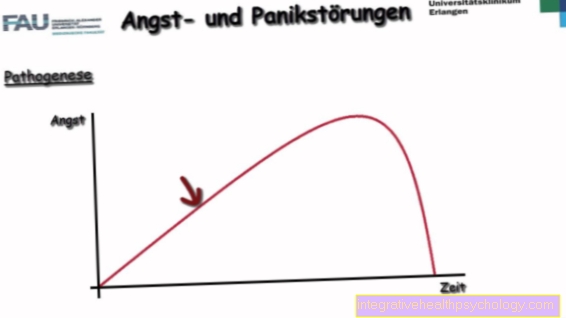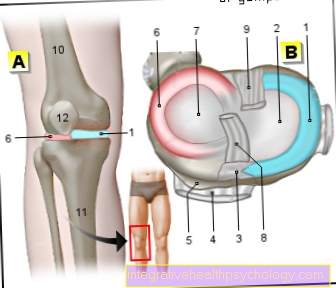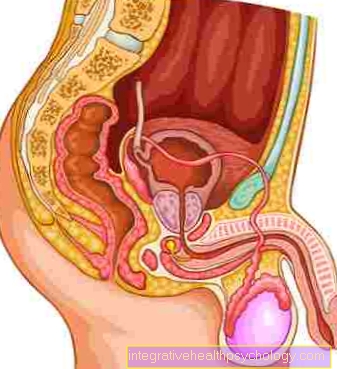Gabapentin
Drug class
Anti-epileptic
definition
Gabapentin is an anti-epileptic and is used in the clinical picture of epilepsy and neuropathic pain.
How does gabapentin work?
Unfortunately, the exact mechanism of action of gabapentin has not yet been clarified. It is believed that it inhibits glutamate receptors (glutamate are stimulating transmitters in the brain) and blocks certain calcium channels.
It is structurally similar to the inhibitory transmitter GABA, but its "anti-epileptic" effect has nothing to do with GABA.
application areas
Gabapetin is used to treat epilepsy that occurs in a specific part of the brain. In technical jargon, these are also referred to as partial epilepsy.
The drug is prescribed both as a single therapeutic agent and as an additional medication. Adults and children over the age of 12 can take gabapentin.
A second area of application of the drug are neuropathic pain (long-lasting pain caused by nerve damage). These arise, for example, after a Shingles, after a Herpes zoster or diabetic Polyneuropathy.
Gabapentin can also be used to relieve pain after surgery.
dosage
Please follow the instructions of the attending physician.
Every patient gets one individual dosagewhich is started slowly and increased if necessary. In addition, gabapentin must not just be discontinued. It has to be sneaked out slowly.
This means that the dose is being reduced more and more, as the body has to get used to the lower level of activity and may only be omitted completely when the level is minimal.
Gabapentin is as Hard capsulel is present and should be swallowed whole with a little water.
The initial one dosage is around 300-900 mg per day.
The Total dose can up to 3600mg per day increase.
Most of the time, gabapentin is taken morning, noon and evening. These details refer to both epilepsy as well as on neuropathic pain.
Contraindication
Gabapentin must not be taken if you have previously been taking the same drug Hypersensitivity reaction occurred.
Careful application
Your doctor needs to know about the following illnesses in order to avoid possible consequential damage:
- Kidney disease
- ongoing nausea
- Vomit
- and stomach pain while ingestion
Please contact the doctor immediately, these are signs of an acute one Inflammation of the pancreas.
- Hemodialysis
- pregnancy: Although there is no study of gabapentin in pregnancy, the use of other anti-epileptic drugs could increase the risk of Malformations of the unborn child to be shown. Pregnant women should therefore expressly not take gabapetin products. It should also be mentioned that women of childbearing potential must use contraception if they are taking gabapentin. If you are concerned that you are pregnant, contact your doctor. Sudden discontinuation is not advisable, as the reduced drug level can cause seizures.
- Lactation: Gabapentin can pass into breast milk and should not be breast-fed if an anti-epileptic drug is taken at the same time.
Side effects
As with other medicines, gabapentin can also cause certain Side effects occur. If this is the case, contact your doctor immediately.
The following side effects can often serious consequences to have:
- heavy allergic reaction with swelling of the lips and face (allergic reactions can be fatal under certain circumstances.)
- Redness and skin rash
- perhaps Hair loss
- Sign of an acute Inflammation of the pancreas (Nausea, vomiting, abdominal pain)
- Muscle pain and weakness when taking gabapentin and hemodialysis treatment
More very frequent unwanted consequences from gabapentin are:
- fever
- Drowsiness
- dizziness
- Daytime sleepiness
- viral infections
Frequently also occur:
- Inflammation of the lungs, ears and urinary tract
- Leukocytosis (low number of white blood cells)
- changed appetite
- Mood swings
- Nervousness, fear
- Visual disturbances
- high blood pressure
- a headache
- sleep disorders
- Gastrointestinal complaints like diarrhea, constipation, nausea and Vomit
- Joint pain
- Muscle twitching
- Erectile dysfunction
To occasionally Occurring side effects include:
- Hives
- Racing heart
- increased liver values
- Hallucinations
- Sedentary lifestyle





























